| |
| |
|
we should also be aware of our responsibilities. If we accept that others have an equal right to peace and happiness as ourselves do we not have a responsibility to help those in need? |
|
|
|
|
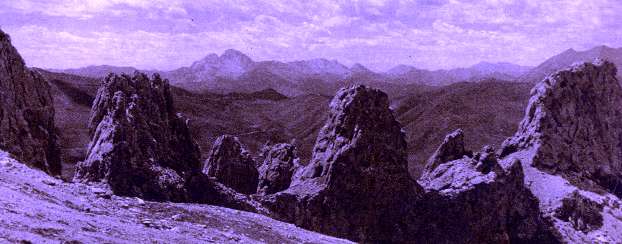 Crossing over into Tibet, the gates of heaven were opened and a mysterious world of luminous colors stretched out before one's eyes. |
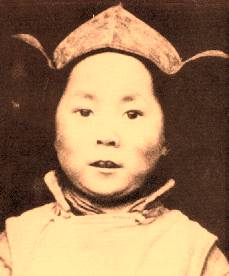 |
"I was born on July 6, 1935 in the far northeastern province of Amdo in the village of Taktser, a small and poor settlement which stood on a hill overlooking a broad valley. My parents were small farmers among about 20 other families making a precarious living off the land raising barley, buckwheat, and potatoes. When I was not quite three years old, a search party had been sent out to find the new incarnation of the Dalai Lama." While laying in state after death, the head of the previous 13th Dalai Lama had turned to face the Northeast - the province of Amdo - thus indicating the region where he would take rebirth. Shortly after that one of the senior lamas had a vision of a house with strangely shaped guttering. After finding the house, various relics of the previous Dalai Lama along with toys attractive to a small boy were presented to the three year old Lhamo Thondup (the child Dalai Lama's original given name). The child recognized the head of the search party, calling out to him, and also correctly identified only those items that were his in his former life, saying 'It's mine, It's mine.' The Fourteenth Dalai Lama had been found. Excerpted from: Freedom in Exile, the Autobiography of the Dalai Lama |
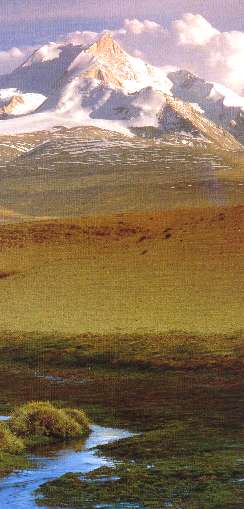 | Journey to Lhasa "We now entered some of the most remote and beautiful countryside in the world: gargantuan mountains flanked by immense flat plains which we struggled over like insects. Occasionally, we came upon the icy rush of meltwater streams that we splashed noisily across. And ever few days we would come to a tiny settlement huddled amongst a blaze of green pasture, or clinging as if by its fingers to a hillside. Sometimes we could see in the far distance a monastery perched impossibly on top of a cliff. The journey took three months. I remember very little detail apart from a great sense of wonder at everything I saw: the fast herds of wild yaks ranging across the plains, the smaller groups of wild asses and occasionally a shimmer of gowa and nawa, small deer which were so light and fast they might have been ghosts. I also loved the huge flocks of hooting geese we saw from time to time." From: Freedom in Exile, the Autobiography of the Dalai Lama |
|
"My mother was undoubtedly one of the kindest people I have ever known. She was truly wonderful and loved, I am quite certain, by all who knew her. She was very compassionate. Once, I remember being told, there was a terrible famine in nearby China. As a result, many poor Chinese people were driven over the border in search of food. One day, a couple appeared at our door, carrying in their arms a dead child. They begged my mother for food, which she readily gave them. Then she pointed to the child and asked whether they wanted help to bury it. When they had caught her meaning, they shook their heads and made it clear that they intended to eat it. My mother was horrified and at once invited them in and emptied the entire contents of the larder before regretfully sending them on their way. Even if it meant giving away the family's own food so that we ourselves went hungry, she never let any beggars go empty-handed." From: Freedom in Exile, the Autobiography of the Dalai Lama |  |
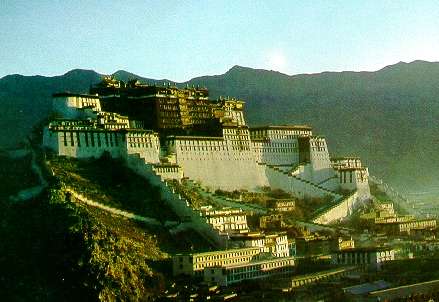 "Although it is very beautiful, the Potala was not a place to live. It was built on a rocky outcrop known as the 'Red Hill' on the site of a smaller building, at the end of the time of the Great Fifth Dalai Lama, who ruled during the seventeenth century. When he died in 1682, it was still far from completion so his faithful Prime Minister concealed the fact of his death for fifteen years until it was finished, saying only that His Holiness had embarked on a long retreat. As a child, I was given the Great Fifth's own bedroom on the seventh (top) story. It was pitifully cold and ill-lit. One of the compensations of living in the Potala was it contained numerous storerooms. These were far more interesting to a small boy than those rooms which contain silver or gold or priceless religious artifacts. I much preferred the armoury with its collection of old swords, flintlock guns and suits of armor. But even this was as nothing compared with the unimaginable treasure in the rooms containing some of my predecessor's belongings. Amongst these I found an old air rifle, complete with targets and ammunition, a telescope, and piles of illustrated books in English about the First World War." From: Freedom in Exile, the Autobiography of the Dalai Lama |
|
"There were about ten Europeans living in Lhasa throughout my childhood. I did not see much of them and it was not until Lobsang Samten brought Heinrich Harrer to me that I had a chance to get to know an inji as Westerners were known in Tibet. Heinrich Harrer turned out to be a delightful person with blond hair such as I had never seen before. I nicknamed him Gopse, meaning 'yellow head'. As an Austrian, he had been interned during the Second World War, a prisoner of the British in India. But somehow he had managed to escape with a fellow prisoner named Peter Aufschnaiter. Together they made their way to Lhasa. This was a great achievement, as Tibet was officially out of bounds to all foreigners. It took them about five years living as nomads before they finally reached the capital. When they arrived, people were so impressed with their bravery and persistence that the Government permitted them to stay. Naturally, I was one of the first to hear of their arrival and I became quite curious to see what they were like, especially Harrer, as he quickly developed a reputation as an interesting and sociable person. He spoke excellent colloquial Tibetan and had a wonderful sense of humour, although he was also full of respect and courtesy. As I began to get to know him better, he dropped the formality and became very forthright, except when my officials were present. I greatly valued this quality." From: Freedom in Exile, the Autobiography of the Dalai Lama | 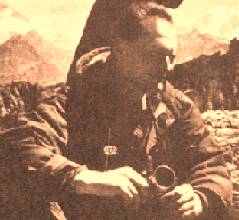 Heinrich Harrer, Austrian Adventurer, Mountain Climber |
|
Heinrich Harrer's Account: "The fifteenth of each Tibetan month is one of the great days. There is a magnificent precession in which the Dalai Lama takes part. Tsarong had promised as a window in one of his homes overlooking the Parkhor. While the brightly colored crowd flowed through the streets we sat at our window with Mrs Tsarong. Our hostess was a friendly old lady who had always mothered us. Night fell swiftly, but soon the scene was brightly illuminated with a swarm of lights. There were thousands of flickering butter lamps. The moon came up over the roofs to throw more light on the proceedings. The months are lunar in Tibet so it was full moon on the fifteenth. Everything was ready: the stage was set and the great festival could now begin. The voices of the crowd were hushed in anticipation. The great moment had come. The cathedral doors opened and the young God-King stepped slowly out, supported on the right and left by two abbots. The people bowed in awe. According to strict ceremonial they should prostrate themselves but today there was no room. As he approached they bowed, as a field of corn bends before the wind. No one dared to look up. With measured steps the Dalai Lama began his solemn circuit of the Parkhor. From time to time he stopped before the figures of butter and gazed at them. He was followed by a brilliant retinue of all the high dignitaries and nobles. After them followed the officials in order of precedence. In the procession we recognized our friend Tsarong, who followed close behind the Dalai Lama. Like all the nobles, he carried in his hands a smoldering stick of incense. The awed crowd kept silent. Only the music of the monks could be heard - the oboes, tubas, kettledrums, and chinels. It was like a vision of another world, a strangely unreal happening. In the yellow light of the flickering lamps the great figures of molded butter seemed to come to life. We fancied we saw strange flowers tossing their heads in the breeze and heard the rustling of the robes of gods. The faces of these portentous figures were distorted in a demonic grimace. Then the God raised his hand in blessing. Now the Living Buddha was approaching. He passed quite close to our window. The woman stiffened in a deep obeisance and hardly dared to breathe. The crowd was frozen. Deeply moved we hid ourselves behind the women as if to protect ourselves from being drawn into the magic circle of this Power. We kept saying to ourselves, 'It is only a child.' A child indeed, but the heart of the concentrated faith of thousands, the essence of their prayers, longings, hopes. Whether it is Lhasa or Rome - all are united by one wish: to find God and to serve Him. I closed my eyes and hearkened to the murmering prayers and the solemn music and sweet incense rising to the evening sky." From: Seven Years in Tibet, by Heinrich Harrer | 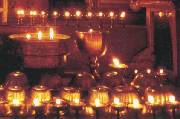
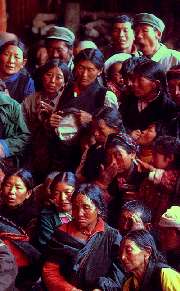 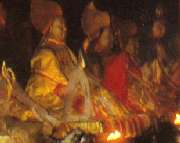
|
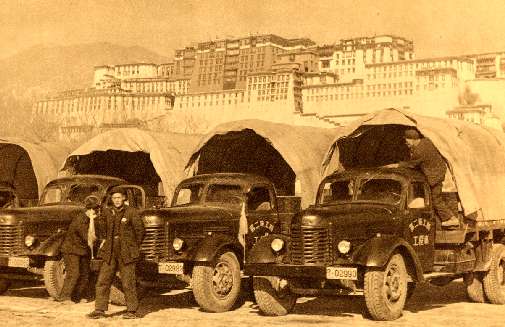
|

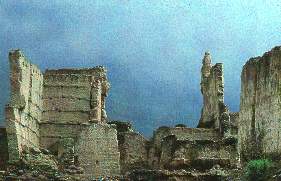 Approximately 1.2 million Tibetans died during the thirty years following the Chinese occupation in 1949. About 125,000 Tibetans followed the Dalai Lama into exile, to settle in India or other parts of the world. Due to population transfers of Chinese to Tibet and forced birth control of Tibetans still in Tibet, the Chinese in Tibet now outnumber native Tibetans. Almost all the monasteries in the country were systematically destroyed by the officially atheist Chinese Government and the practice of Tibetan religion (their primary way of life before the occupation) was strictly outlawed. It was especially forbidden to even possess a picture of the Dalai Lama. Policies to stamp out Tibetan culture are in effect even today. An official Chinese Government document from 1991 says: "We should oppose all those who work to split the motherland. There should be no hesitation in taking harsh decisions to deal with any political disturbance carried out in the name of nationality or religion"
Approximately 1.2 million Tibetans died during the thirty years following the Chinese occupation in 1949. About 125,000 Tibetans followed the Dalai Lama into exile, to settle in India or other parts of the world. Due to population transfers of Chinese to Tibet and forced birth control of Tibetans still in Tibet, the Chinese in Tibet now outnumber native Tibetans. Almost all the monasteries in the country were systematically destroyed by the officially atheist Chinese Government and the practice of Tibetan religion (their primary way of life before the occupation) was strictly outlawed. It was especially forbidden to even possess a picture of the Dalai Lama. Policies to stamp out Tibetan culture are in effect even today. An official Chinese Government document from 1991 says: "We should oppose all those who work to split the motherland. There should be no hesitation in taking harsh decisions to deal with any political disturbance carried out in the name of nationality or religion"|
There are more than a thousand different trees in the primeval forests of Tibet, of which the most common are firs, Yunnan pines, Tibetan Cypress, and dragon spruces.
Half of Tibet's forests have been felled since 1959 providing the Chinese with $50 billion worth of lumber. The most common form of timber harvesting is clear cutting which has led to vast hillsides being denuded. Four countries depend on the rivers of Tibet for their sustenance. Some of the major floods in these countries during the last decade have been attributed to deforestation related siltation of Tibet's rivers. More than a quarter of Tibet's mineral resources have been extracted since 1959. Tibet contains the largest uranium deposits in the world. Uranium has been processed in Tibet leading to contamination of drinking water and the death of Tibetans in Ngapa, Amdo. Radioactive contamination of other groundwater is a great concern. China is reported to have stationed approximately 90 nuclear warheads in Tibet. WWW.Tibet.com, Select White Papers WWW.OneWorld.Org, Search: Tibet | 
|
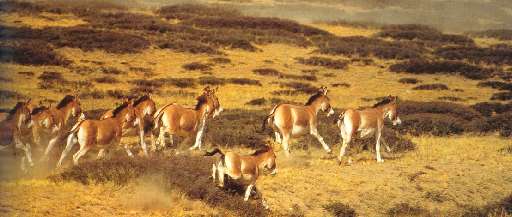
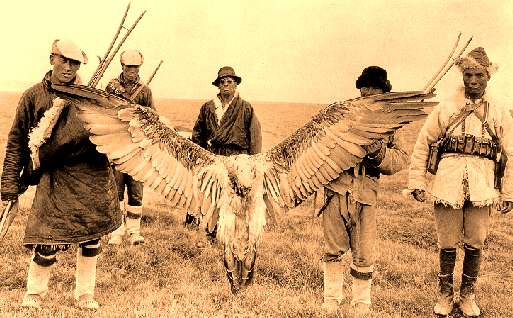
|
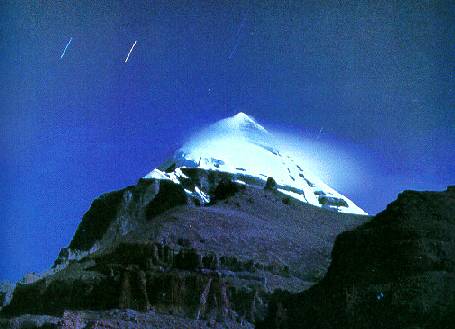 "Only he who has contemplated the divine in its most awe inspiring form, who has dared to look into the unveiled face of truth without being overwhelmed or frightened - only such a person will be able to bear the powerful silence and solitude of Kailas and its sacred lakes, and endure the dangers and hardships which are the price one has to pay for being admitted to the divine presence on the most sacred spot on earth. Those who have given up comfort and security and the care for their own lives are rewarded by in indescribable feeling of bliss, of supreme happiness. Their mental faculties seem to be heightened, their awareness and spiritual sensitivity infinitely increased, their consciousness reaching out into a new dimension - their individual consciousness giving place to an all-embracing cosmic consciousness." From: The Way of the White Clouds, A Buddhist Pilgrim in Tibet, by Lama Anagarika Govinda |
|